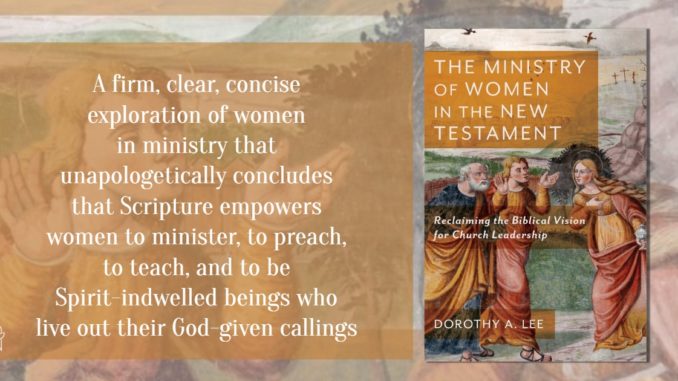
Published by Baker Academic on February 16, 2021
Genres: Academic, Theology
Buy on Amazon
Goodreads

Respected scholar Dorothy Lee considers evidence from the New Testament and early church to show that women's ministry is confirmed by the biblical witness. Her comprehensive examination explores the roles women played in the Gospels and the Pauline corpus, with a particular focus on passages that have been used in the past to limit women's ministry. She argues that women in the New Testament were not only valued as disciples but also given leadership roles, which has implications for the contemporary church.
I’m writing this review the day after reports that Beth Moore is formerly leaving the Southern Baptist Convention. That’s a relevant fact because, for decades, Moore has been the SBC’s most prominent female leader. In recent years, you began to see the cracks in the relationship as the SBC grew more patriarchal and Moore grew more egalitarian. It all finally reached a formal breaking point and, I expect, Moore will have no shortage of support from egalitarian denominations.
During this same time, the conversation about women in ministry has grown even louder and even into the more conservative and patriarchal sections of evangelical Christianity. More and more women are attending seminary, leading churches, preaching the Gospel, and contesting the notion that Scripture forbids female leadership.
Dr. Dorothy A. Lee’s The Ministry of Women in the New Testament is a firm, clear, concise exploration of women in ministry from the ministry of Jesus into the early church that unapologetically concludes that Scripture empowers women to minister, to preach, to teach, and to be Spirit-indwelled beings who live out their God-given callings. I use the term “unapologetically” not to mean that Lee writes brashly or with a chip on her shoulder, but in the sense that she is not mounting some sort of defense of women in ministry. This is not an argument, not an apologia; it is an exploration of fact that leaves very little to argue against.
The first part of the book covers the ministry of women as portrayed in the New Testament writings. The second covers women in ministry as portrayed in the tradition of the Early Church. It’s this latter section, even though it’s more of an addendum to the book proper, that really caught my attention. It’s one thing to exegete Paul, for instance, and conclude that the typical passages used to preclude women from ministry actually don’t mean that within their cultural contexts. The comeback to that is always to complain about a new faulty “liberal” interpretation of sacred Scripture.
By showing that the early church relied upon women in leadership positions, Lee is able to prove that an egalitarian ecclesiology is present from the time of Jesus. Those with better tools to know contextually, culturally, and linguistically what those passages meant obviously didn’t conclude they meant women couldn’t lead. In this section, Lee is also able to highlight mothers of the faith who have been overlooked because of the patriarchal nature of the church.
Elsewhere, Lee’s exploration of the person of Mary, the virginal conception of Christ, and the resultant female-created humanity of Jesus is nothing less than paradigm-shifting. To quote, in part:
“It is painfully ironic that Mary’s role in orthodox Christian theology as the ‘God-bearer’ (Theotokos), the one who conceives and carries that Son of God in her womb—who nurtures him through her placenta and feeds him with her breast when he is born—could lead to a diminished perspective on women’s relationship to Christ…By being the sole guarantor of his humanity, Mary raises women’s status as nothing else could…Christian belief in the virginal conception confirms that women are as closely bound to Christ as men are. Their historical unlikeness in one sense is compensated by their oneness to Christ in another sense—their gender confirmed in Jesus’s female-generated humanity.”
The bulk of the book is spent painstakingly going through the New Testament and exploring each passage and person relevant to women in ministry. While Lee is thorough, I don’t know that I saw anything I would consider revolutionary. Her positions are strong, bold, and obvious. They won’t the debate because these points have settled it thus far. Lee is content to not even try to bring up counterpoints. The merits of the original point stand on their own. While I would’ve liked to have seen a bit stronger response—or a direct response—to the complementarian position, that’s not Lee’s purpose nor does she pretend that it is.
Her final conclusion is simple:
“If Christ represents—and in doing so redeems—females as well as males, gentiles as well as Jews, slaves as well as free people, then the concomitant is also the case. Any human being, by virtue of the humanity that she or he shares by virtue of being made in the divine image and remade in Christ through the incarnation, is capable of representing Christ, a representation dependent not on gender but on vocation—whether at the altar or in the pulpit, whether in day-to-day acts of service or in martyrdom.”
The Ministry of Women in the New Testament is a book that needs to be read, digested, grappled with, and above all, implemented. Dorothy Lee has handed us an exploration of the ancient tradition. It is up to us to follow it, even if it contravenes our more modern ones.
